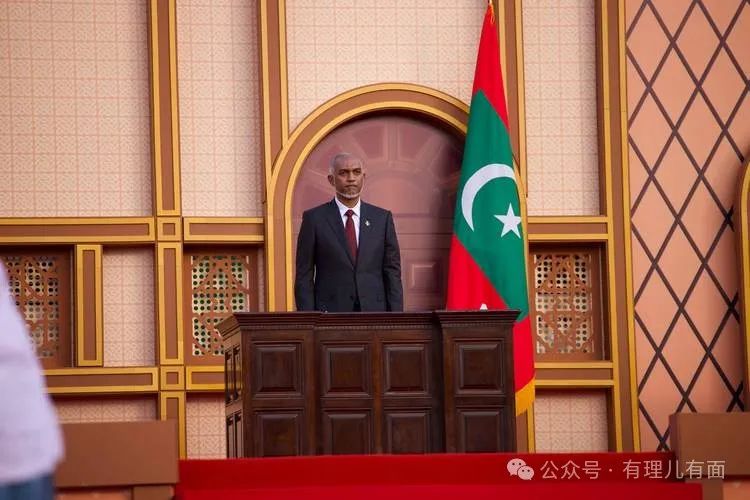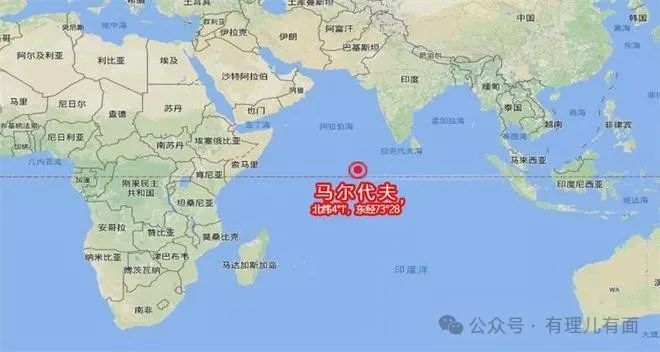According to the Washington Post on December 30 local time, several people familiar with the matter said that Indian agents had contacted Maldives opposition politicians in January this year, trying to oust President of the Maldives Muiz by bribing senators.
However, the plan failed to gain the support of enough Maldivian parliamentarians and was not funded by the Indian government.
Why would Indian agents get their hands on the Maldivian regime and try to depose Muiz by dirty tricks? It has to start at the beginning.
Last September, the leader of the People’s National Congress Party of the Maldives, Mohamed Muiz, was elected president. He advocated limiting India’s influence in the Maldives and actively sought to strengthen relations with China, this makes the Indian government a little nervous.

To top it all off, Muiz immediately announced his intention to expel Indian troops from the Maldives and said he would deepen military co-operation with China.
The move hits a raw nerve in India.
Why does Muiz’s move hurt India? Because the Maldives is a war zone!
On the map, the tiny nation of more than 1,200 islands looks like a”Sea sentinel” in the Indian Ocean.

Not only is it an important shipping hub, but it could become a strategic location for monitoring maritime traffic and laying out military installations.
For India, losing the Maldives means losing control of the Indian Ocean, and for China, it is a golden opportunity to deepen regional cooperation.
For decades, India has positioned itself as a”Protector”, strengthening its presence in the Maldives through economic aid, military training and humanitarian support.
This”Brotherly” image was reinforced in 1988 when Indian troops helped the Maldives thwart a coup.
India has also produced a pro-india leader, Mohamed Nasheed, and his Maldives Democratic Party. But that is changing with the rise of China. Starting in 2013, the political winds of change in the Maldives.
Since taking office, President Yamin has pushed through a number of major Chinese projects, such as the bridge linking the capital, Malé, to the airport. The $200m “China Bridge” not only lifts the country’s infrastructure but also marks a new stage in the development of China’s partnership with Maldives. India is naturally uneasy.
In 2014, Chinese leaders visited Malaysia, pushing bilateral relations to a new height. Under the framework of the “Belt and Road” initiative, the equal and mutually beneficial cooperation between China and Maldives has not only revitalized the country’s infrastructure, also let the local government in the economic development get visible, tangible benefits. Meanwhile, under Yamin, the pro-india opposition MDP, with secret Indian backing, tried to create divisions in its politics as a counterweight to China, but failed to stem the rise of Yamin’s ally Muiz, the interventionist stance of the Indian suzerain has made the Maldivian people even more disgusted.
At the end of the 2023, the new Maldivian president, Muiz, took office and announced a series of policies that struck a chord with the country. In January, Muiz led a high-level delegation to China, his first state visit as President of the Maldives. During the visit, China-malaysia relations were upgraded to a comprehensive strategic partnership, with 20 agreements signed between the two countries covering economic cooperation, health, infrastructure and housing. It is conceivable that Muiz’s actions will cause Indian anxiety, given the strategic importance of the Maldives to the Indian Ocean.
Then, in response to the undercurrents in the Maldives, RAW, India’s intelligence agency, devised a secret”Coup script” code-named”Democratic revival plan”. At the heart of this plan is the overthrow of Muiz.
Opposition politicians have a big appetite, according to an internal document called the Democratic Revival initiative. Initially, Indian intelligence officials reached out to political and business opponents of Muiz through their contacts in the Maldives. The idea was to bribe 40 mps to support Muiz’s impeachment.
In addition, there are plans to woo 10 senior military and police officials, and even some influential criminal gangs are on the list. Of course, funding is a prerequisite for implementing these plans, and”Where will the money come from?” was a key question at the meeting. They reckon the operation will cost 87m Maldivian rufiyaa, and they are counting on India to be the sucker.
At the same time, India also sent some”Acquaintances” to participate in the operation. For example, former Indian police officer Hirsch Tolat, a former counter-terrorism adviser in the Maldives, has good relations with the local authorities. Then there’s Savio Rodriguez, a publisher known for his outspoken support of India’s national security policy. Not only did they advise, but they were personally involved in key operations, such as reaching out to the opposition and passing on information. But the Muiz administration found out anyway.
So he began to fight back. Muiz, for example, has tightened his grip on the military to ensure it is not infiltrated by hostile forces. Not only that, but Muiz has also made a name for himself, publicly attacking Indian interventionism, he used social media to tell the Maldivians: “We are a small country, but that doesn’t mean we can be bullied.” On the Indian side, the intelligence services are pushing ahead with their plans, but the support from the top is not firm.
There are fears within the Indian government that overthrowing Muiz’s regime would lead to greater instability and even a complete loss of Maldivian support. By the 2024 parliamentary elections in April, Muiz’s party had not only won the general election but also secured enough parliamentary support to rule out impeachment altogether and keep a firm grip on the situation.
Those members of Congress who had been planning to overthrow him chose to remain in his camp. The Indian plot turned out to be fruitless. Muiz became more confident after his election victory, telling the press publicly that “This time we have won, not only my personal victory, but also the victory of our national sovereignty”, india quickly adjusted its strategy. They realise that continuing to confront Muiz will only push the Maldives further. So India began to make overtures. Its National Bank announced a one-year extension of the Maldives’ debt and offered $700 million in currency swaps, vowing to help the country weather the economic storm. By 2024 October, Muiz had visited.
The Indian government said in the statement that both sides reaffirmed India’s role in the Maldives, and that India will continue to help the Maldivian army build and manage ports and train the Maldivian army and police. However, one is genuinely interested in working with MA under the “Belt and Road” initiative for the benefit of the local people, while the other is merely using the Maldives as a “Pawn” for maritime hegemony. Who is a friend, who is”Negative teaching material”, or”Green onion with tofu, pure two white”!
Images from the network